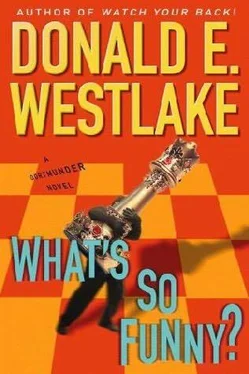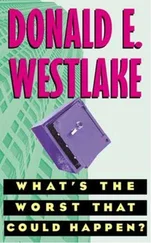"All right, Pembroke," Eppick said, and off they went.
Kelp, with his amiable smile, said, "John tells me you know all about us."
"Oh, I doubt that," Eppick said. "I only know that little part of your activities that's made it into the filing system. The tip of the iceberg, you might say."
"And yet," Kelp said, "I don't seem to have any files on you at all. John says you're retired from the NYPD."
"Seventeen months ago."
"Congratulations."
"Thank you."
"Where was it in the NYPD," Kelp wondered, "did they make use of your talents?"
"The last seven years," Eppick told him, not seeming to mind the interrogation at all, "I was in the Bunco Squad."
"They still call it that? 'Say, did you drop this wallet? That kinda thing?"
Eppick laughed. "Oh, there's still some street hustle," he said, "but not so much any more. You watch television half an hour, you know every scam there is."
"Not every."
"No, not every," Eppick conceded. "But these days, it's mostly phone and Internet."
"The Nigerians."
"All that money they're trying to get out of Lagos and into your bank account," Eppick agreed. "Amazing how often we find the sender in Brooklyn."
"Amazing you find the sender," Kelp told him.
"Oh, now," Eppick said. "We do have our little successes."
"That's nice," Kelp said. "But now you're out on your own. John tells me you got a card and everything."
"Oh, I'm sorry," Eppick said. "I should of given you one." And, sliding two fingers under the lapel of his topcoat, he brought out another of his cards and gave it to Kelp.
Who studied it with interest. "'For Hire, " he read. "Doesn't narrow it much."
"I didn't want the clients to feel constricted."
"You had many of those?"
"Mr. Hemlow is my first," Eppick said, "and naturally the most important."
"Naturally."
"I don't want to let him down."
"No, of course not," Kelp agreed. "Here at the beginning of your second career."
"Exactly."
"Yet John tells me," Kelp said, "this little thing you put him on the send for, he tells me it isn't gonna be easy."
"If it was gonna be easy," Eppick said, "I woulda sent a boy."
"That's true."
"I got every confidence in your friend John," Eppick said. Looking at Dortmunder, who was at that moment shifting position this way and that because after a while and a few stops at red lights the limo floor and back weren't quite as comfortable as he'd thought at first, he said, "I believe also that John has every confidence in me."
"Sure," Dortmunder said. When he crumpled himself into the corner, it was a little better.
JUDSON BLINT TYPED names and addresses into the computer. Here it was, nearly ten in the morning, and he still hadn't finished with Super Star Music, while stacked up beside his left elbow were the letters, the applications, and the checks — lovely checks — for Allied Commissioners' Courses and Intertherapeutic Research Service. What a long way to go.
For some reason, the mail was always heaviest on Fridays. Maybe the post office just wanted to clear everything out before the weekend. For whatever reason, Friday was always the day that made this job seem most like a job, instead of what it actually was, which was three extremely profitable felonies.
Take Super Star Music, on which he was still working at ten in the morning. Advertising in magazines likely to draw in the young and the gullible, Super Star Music promised to make you rich and famous by setting your song lyrics to music. Alternately, if it's music you got, they'll give you lyrics. Now, most amateurs do simple marching-beat doggerel, so there's lots of music out there to match; just shift the rhythms around a bit. As for lyrics, Bartlett's Familiar Quotations has some pretty good ones, or there's always what's in the next envelope right here.
Allied Commissioners' Courses, on the other hand, would teach you everything you needed to know to make a fine living as a detective; sure. And if Intertherapeutic Research Service's dirty book doesn't improve your sex life, check your pulse; maybe you died.
Judson Blint's task in this triple threat ongoing skimming of the pittances of the reality impaired was simple. Each day, he opened the envelopes, typed the return addresses into the computer and attached the labels to the right packages. Then he carried the outgoing mail on a large dolly down to the post office in the lobby of this building, brought up the next batch of suckers, and carried the checks to the inner office of J.C. Taylor, who'd originally thought up all this stuff and would give him twenty percent of the intake simply for doing the clerical work — usually between seven and eleven hundred a week.
He'd been at this scam since July, when he'd first come to Manhattan out of Long Island, fresh out of high school and convinced he was the best con artist of all time, until J.C. saw through him in a New York minute but gave him this job anyway, for which he would be forever grateful. Also, it had already led a bit to even better things.
He was thinking about those better things, feeling sorry again that Stan Murch's idea at the O.J. the other night had been such a loser, because it was time to pick up a little extra coinage here and there before winter set in, when the hall door opened and, before Judson could do his spiel— "J.C. Taylor isn't in at the moment, have you an appointment, I'm terribly sorry" — Stan Murch himself walked in. He shut the door behind himself, nodded at Judson, and said, "Harya."
"Hi."
"I was in the neighborhood."
Of the seventh floor of the Avalon State Bank Tower on Fifth Avenue near St. Patrick's Cathedral? Sure. "Glad you could drop by," Judson said.
There were chairs in this small crowded room, other than the one at the desk where Judson sat, but they were all piled high with books, either detective or sex. Stan looked around, accepted reality, and leaned back against a narrow clear spot of wall beside the door. Folding his arms, he said, "That was really too bad about the other night."
"Yeah, it was."
"I just had the feeling, you know, the guys didn't quite get the concept."
"I had that feeling, too."
"You in particular," Stan said. "A bright young guy, not stuck with old-fashioned thinking."
"Well, it just seemed to me," Judson said, wanting to get out of this without acknowledging there was anything to get out of, "the other guys had a lot more expertise than me, so I oughta go along with the way they saw things."
"I got a certain expertise, too, you know," Stan said, and looked as though he were thinking about getting irritated.
" Driving expertise, Stan," Judson said. "You got the most driving expertise I ever saw in my life."
"Well, yeah," Stan said, but would not be deflected. "On the other hand," he said, and the inner door opened.
They both turned to look as J.C. herself walked in from her office, saying, "I heard voices. Hello, Stan. Keeping my staff from their work?" A striking if tough-looking brunette of around thirty, who moved in a style somewhere between a runway model's strut and a cheetah's lope, J.C., when she came into a room, particularly dressed as now in pink peasant blouse and a short black leather skirt and heeled sandals with black leather straps twining halfway up to the knee, it was impossible to look away.
Stan didn't even try. "Just exchanging a word or two, J.C.," he said. "Exercising our chins."
"Talking about the golden dome?" J.C. asked him.
Stan didn't like that. "Oh, Tiny told you," he guessed, Tiny Bulcher being J.C.'s roommate somewhere around town, a pairing that seemed to those who knew them to have been made, if not in Heaven, possibly in Marvel Comics.
"Tiny told me," she agreed. "He said it was the dumbest idea he'd heard since Lucky Finnegan decided to walk from the Bronx to Brooklyn stepping only on the third rail." To Judson she explained, "Lucky was very proud of his sense of balance."
Читать дальше












